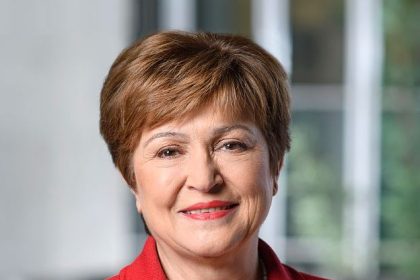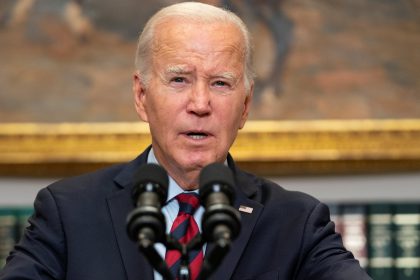IMF Director Sets the Stage for IMF-World Bank Spring Meetings

WASHINGTON — As the world’s finance ministers and central bank governors prepare to convene in Washington, D.C., for the IMF-World Bank spring meetings next week, Kristalina Georgieva, managing director of the International Monetary Fund, spoke about how this event comes at a delicate moment for the global economy.
“Making the right policy choices will define the future of the world economy,” Georgieva told the audience at the Atlantic Council event held on April 11, dividing the possibilities into the turbulent twenties, tepid twenties and transformational twenties.
Georgieva previewed the IMF’s forthcoming World Economic Outlook and Global Financial Stability Report, in which the global economy is at an inflection point. Cooling inflation and resilient growth are achievable, indicating the possibility of a soft landing. But the specter of geopolitical conflicts, economic fragmentation and staggering debt burdens loom large, threatening to derail a fragile global recovery.
“The resilience of the world economy is mostly due to the sound economic policies that we built over the last years,” Georgieva said. “This resilience is helped by strong labor markets and an expanding labor force … partially due to immigration.”
“It is tempting to breathe a sigh of relief. We have avoided the global recession and a period of stagflation … It has not happened, but there are still plenty of things to worry about.”
Georgieva emphasized the need for proactive measures to address a range of complex challenges.
Tension among nations is a primary concern, particularly between the world’s two largest economies. These tensions, coupled with lingering inflation and a nearly worldwide “significant and broad-based slowdown in productivity” add layers of complexity to an already delicate economic landscape.
“We operate in a world in which we must expect the unexpected,” she said. “Without a course correction, we are indeed heading for the tepid twenties.”
Dealing decisively with inflation and debt and promoting economic activity is necessary for the transformational twenties scenario. To do this, she offered a multi-stage approach.
“First we need to bring back price stability,” Georgieva said, urging central bankers to resist premature interest rate cuts and uphold their independence.
“No more are we in the place of 2020 where everybody went in the same direction,” she said. Rather than a one-size-fits-all approach, she advocates for a more nuanced response based on incoming data.
“Second, the time has come to rebuild fiscal buffers,” she said. “Debt levels in most countries are simply too high.”
Acknowledging that fiscal prudence is a tough sell, particularly in times of political uncertainty, she said the cost of servicing debt was becoming “painful” for many countries and she advocated for “adopting a credible medium-term framework as the ultimate good policy.”
Georgieva underscored the importance of policies to reinvigorate growth, focusing on governance reform, cutting red tape and increasing female labor force participation.
She championed a swift transition to a climate-friendly economy, emphasizing the economic and environmental benefits of transformative investments.
Ultimately, Georgieva emphasized the importance of collective action and international cooperation in tackling the challenges ahead.
“The fundamental choice is between meeting the problems with which the world will be faced through methods of international cooperation or each nation relying on its own resource and its own strength and going its own way,” Georgieva said.
The IMF-World Bank Spring Meetings next week will represent a “collective commitment to cooperation and interactive dialogue.”
“Bringing countries together to pursue opportunities and tackle challenges is more important than it has ever been,” she said “Working together is the choice of good policy, the choice that would deliver what we aspire to.”
Kate can be reached at [email protected].
























